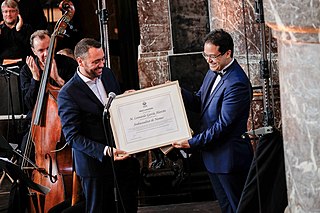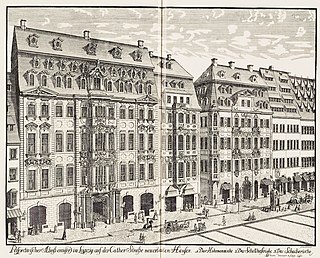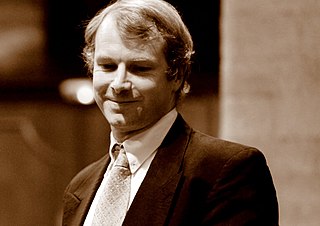Related Research Articles
The trio sonata is a genre, typically consisting of several movements, with two melody instruments and basso continuo. It originated in the early 17th century and was a favorite chamber ensemble combination in the Baroque era.

The Brandenburg Concertos by Johann Sebastian Bach are a collection of six instrumental works presented by Bach to Christian Ludwig, Margrave of Brandenburg-Schwedt, in 1721. The original French title is Six Concerts Avec plusieurs instruments, meaning "Six Concertos for several instruments". Some of the pieces feature several solo instruments in combination. They are widely regarded as some of the greatest orchestral compositions of the Baroque era.

Trevor David Pinnock is a British harpsichordist and conductor.

Basso continuos parts, almost universal in the Baroque era (1600–1750), provided the harmonic structure of the music by supplying a bassline and a chord progression. The phrase is often shortened to continuo, and the instrumentalists playing the continuo part are called the continuo group.

The English Suites, BWV 806–811, are a set of six suites written by the German composer Johann Sebastian Bach for harpsichord and generally thought to be the earliest of his 19 suites for keyboard, the others being the six French Suites, the six Partitas and the Overture in the French style. They probably date from around 1713 or 1714.

The four orchestral suites BWV 1066–1069 are four suites by Johann Sebastian Bach from the years 1724–1731. The name ouverture refers only in part to the opening movement in the style of the French overture, in which a majestic opening section in relatively slow dotted-note rhythm in duple meter is followed by a fast fugal section, then rounded off with a short recapitulation of the opening music. More broadly, the term was used in Baroque Germany for a suite of dance-pieces in French Baroque style preceded by such an ouverture. This genre was extremely popular in Germany during Bach's day, and he showed far less interest in it than was usual: Robin Stowell writes that "Telemann's 135 surviving examples [represent] only a fraction of those he is known to have written"; Christoph Graupner left 85; and Johann Friedrich Fasch left almost 100. Bach did write several other ouverture (suites) for solo instruments, notably the Cello Suite no. 5, BWV 1011, which also exists in the autograph Lute Suite in G minor, BWV 995, the Keyboard Partita no. 4 in D, BWV 828, and the Overture in the French style, BWV 831 for keyboard. The two keyboard works are among the few Bach published, and he prepared the lute suite for a "Monsieur Schouster," presumably for a fee, so all three may attest to the form's popularity.

Peter Watchorn is an Australian-born harpsichordist who has combined a virtuosic keyboard technique, musical scholarship and practical experience in the construction of harpsichords copied from original instruments of the 17th and 18th centuries. As well as presenting many solo public performances and broadcasts of baroque keyboard music and participating in choral and orchestral performances, he has made numerous commercial CD recordings of solo harpsichord music from the 17th and 18th centuries.
New Collegium is a baroque orchestra and chamber ensemble based in The Netherlands. The orchestra was founded in 2006 by Brazilian/Italian harpsichordist Claudio Ribeiro.
The Diapason d'Or is a recommendation of outstanding (mostly) classical music recordings given by reviewers of Diapason magazine in France, broadly equivalent to "Editor's Choice", "Disc of the Month" in the British Gramophone magazine.
Joachim Burmeister was a north German composer, cantor, and music theorist.

Leonardo García Alarcón is an Argentinian conductor specializing in baroque music.

The Sonata in G major for two flutes and basso continuo, BWV 1039, is a trio sonata by Johann Sebastian Bach. It is a version, for a different instrumentation, of the Gamba Sonata, BWV 1027. The first, second and fourth movement of these sonatas also exist as a trio sonata for organ.
Musical instruments used in Baroque music were partly used already before, partly are still in use today, but with no technology. The movement to perform music in a historically informed way, trying to recreate the sound of the period, led to the use of historic instruments of the period and to the reconstruction of instruments.
Johann Pfeiffer was a German violinist, concert master and composer of the late baroque period.

Francis Jacob is a French organist and harpsichordist.

Claire Guimond is a Canadian flute player, founding member and former Artistic Director of Arion Baroque Orchestra.
Sabine Bauer is a German harpsichordist, pianofortiste and flautist specialising in the repertoire of Baroque music and classical period, adept at historically informed performance, i.e. performance on ancient instruments.
Musica Fiorita was an ensemble for baroque music founded in 1990 and based in Basel, which was conducted by the harpsichordist Daniela Dolci. The ensemble concentrated in particular on rediscovering unknown works by composers of the 17th and 18th centuries and their historical performance practice. In March 2020, it ceased its concert activities.
References
- ↑ See Ramée's website ramee.org
- ↑ Joachim Burmeister, Musica poetica (1606) augmentée des plus excellentes remarques tirées de Hypomnematum musicae poeticae (1599) et de Musica autoschédiastikè (1601), introduction, Latin text and French translation, notes and lexicon by Agathe Sueur and Pascal Dubreuil, Wavre, Mardaga, 2007